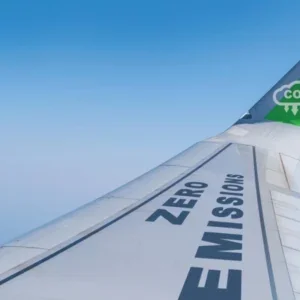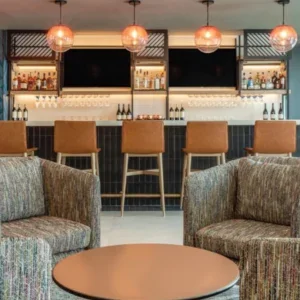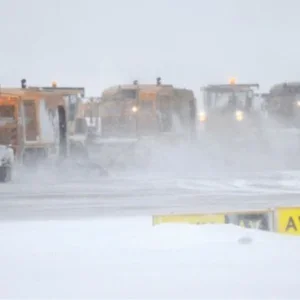It’s hard not to be distracted by the view from the window of Alexandre de Juniac’s spacious office. Directly overlooking the runway at Geneva Airport, a KLM aircraft jets out towards a snow-topped horizon, while down below, cargo is being unloaded, and buses shuttle to and from terminals.
De Juniac has occupied this corner office since September 2016, when he became director-general and CEO of the International Air Transport Association (IATA). “It’s been a busy first year,” says De Juniac. “This is an industry exposed to many events, risks and uncertainties coming from various origins, whether it’s governance, meteorology or volcanoes. There is always something happening.”
On paper, the Frenchman, whose CV boasts previous chairman-CEO roles at Air France-KLM and Air France – as well as 14 years at aerospace, defence and transportation company Thales – was something of a given for his new role. But even such experience could not have prepared him for the geopolitical confusion that De Juniac and IATA had contended with in 2017 when US and UK governments placed a ban on laptops and iPads in hand luggage on flights to certain Middle Eastern countries.
London and Washington argued the prohibition – since lifted in July – was an anti-terrorist precaution. But De Juniac was not impressed, denouncing the measures at a speech in Montreal in March as ineffective and “not an acceptable long-term solution”.
“The main issue for us has been security, as a result of those bans issued by the UK and US,” he says. “Those decisions were taken very suddenly and without any prior consultations, making it difficult for us to catch up, and define a policy and set of measures that were appropriate, applicable and reasonable.”
Private business
De Juniac believes IATA, the aviation industry’s main body, “did a good job” in its reaction to the whims of US and UK foreign policy. At its annual general meeting in July, it passed a resolution urging nations, member airlines and other aviation industry stakeholders to work together on security. The resolution also urged governments to engage in early dialogue with the airline industry, while it weighs up new security measures.
Another area that’s been just as high on the agenda over the past few months has been the creeping privatisation of airports, “from Paris and Sydney to Santiago”. While IATA is not strictly against the airport privatisation – which has been taking place for years – the group has not seen any evidence of successful private sector participation. Rather, it has only contributed to a mix of underinvestment and unnecessary outlays, with regulatory controls left severely wanting.
“The privatisation and corporatisation of airports is a general trend affecting the industry, but it is not always a positive thing,” explains De Juniac. “It needs to be rethought thoroughly, so it’s important that IATA enters discussions with governments about airports of the future and their ownership, and the way they are financed.
“Airports are experiencing infrastructure crises in many parts of the world, due to insufficient capacity, excessive costs or technology that is not up to date. So there is a big need for investment, but at the right level.”
De Juniac – who has also occupied positions in the French Government at the Department of Budget and Ministry of Economy, Industry and Employment – has also sunk his teeth into the contentious matter of European airport charges. According to a recent IATA study, the portion of ticket prices pocketed by EU airports between 2006 and 2016 almost doubled, while air ticket prices remained more or less the same.
Had airport charges remained constant over the past decade, IATA believes consumers would have saved €17 for each one-way trip. In turn, this saving could have generated an extra 50 million passengers, unlocking €50 billion in gross domestic product and creating 238,000 jobs. With these statistics on his side, De Juniac has led calls for the EU to tighten economic regulations at hubs, which he believes the union’s current Airport Charges Directive has failed to do.
New hope
The directive is set to be updated next year. So is he hopeful that airport monopolies might be brought to heel soon? “All we know is that a new directive is coming,” he answers, exercising what might be just of hint of diplomacy.
“The EU is reviewing this directive, so we would like to be very closely associated with the process, in order to say what we would like to happen – and what we would not like not to happen.”
As is customary for the head of an aviation body, De Juniac has accumulated his fair share of air miles over the past year. On his travels, he has given keynote speeches in China, a country that, by IATA’s reckoning, will displace the US as the world’s largest aviation market in 2022.
However, of all the markets, De Juniac believes Africa has the greatest aviation potential. According to IATA, it is set to grow by 5.9% through to 2036, achieving an extra 274 million passengers a year. But challenges still remain on the continent.
African promise
For Africa to unlock its promise, and deliver maximum economic and social benefits, its governments will first need to address ongoing problems around airport infrastructure.
“In Africa, there are two or three key problems,” says De Juniac. “Firstly, its infrastructure needs to be much better – with regard to airports and air traffic control. This relates to problems of cost.
“The cost of infrastructure is much too high, and there are too many taxes, charges and fees.
“It’s just too expensive. We are also calling on governments to do whatever they can to open borders, and encourage airlines to put together and implement all possible measures to encourage the development of more intra-African routes.”
In the wake of the Paris climate change agreement, the aviation sector is under more pressure than ever to clean up its carbon footprint. Some airports are rising to the challenge.
From the start of next year, four hubs belonging to Royal Schiphol Group – Schiphol, Rotterdam The Hague Airport, Eindhoven Airport and Lelystad Airport – will be powered by renewables.
The move ties in with plans by the Dutch Central Government for the country to reduce its greenhouse gas emissions to zero by 2050. In the mid-to-short term, authorities have pledged to switch to 16% sustainable energy by 2023.
Moves towards greener energy are taking place on a broader scale, insists De Juniac, with IATA committed to carbonneutral growth from 2020.
“We are seeing many airports engage seriously in sustainable policies,” he says. “Kansai International in Osaka is doing something very similar to Schiphol, while Paris Charles de Gaulle has installed a biomass plant with wood-fired boilers.
“I’d say the whole industry is committed. We now have some airports that are working with IATA to supply biofuels to aircraft. Next year, in Geneva, we will start to supply it through a new hydrant system. It’s not actually a big investment for airports – just a necessary one.”
De Juniac is only too aware that IATA has its work cut out in the year ahead, from addressing issues as diverse as the safety threat posed by drones – “we need the regulations to prevent drones interfering with air operations around the airport,” – to improving cargo operations at airports (“cargo has been something of a drama for us”).
Security, too, is imperative, with IATA in support of better information sharing between governments and industry on the likes of conflict zones.
But it is infrastructure that IATA will prioritise above all else. As part of its 20-year air passenger forecast, IATA expects 7.8 billion passengers to take to the skies in 2036 – nearly double the four billion passengers of 2017.
Without the right investments in infrastructure and air traffic control, there are genuine fears that airports – and airspace – will struggle to cope with the predicted swell in passengers.
“The board is monitoring our objectives,” he says, unable to divulge much further. They are measuring the effectiveness of IATA in reaching its goals.
“While we have several goals in terms of security, safety, airport charges, and the environment, airport infrastructure is top of the list.”
And with that, our time is up. De Juniac politely whisks me out, just as another aircraft lands on the strip below us. He has things to do. One gets the sense next year will be a busy one for the IATA chief.






